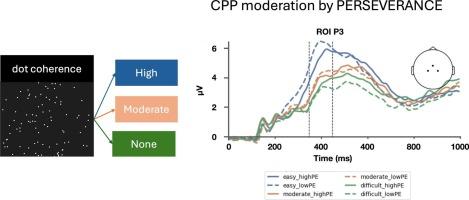Delusional self-confidence? Trait perseverance is associated with increased brain activity reflecting confidence about own performance in a dot random motion task
IF 2.6
2区 心理学
Q1 PSYCHOLOGY, SOCIAL
引用次数: 0
Abstract
Most people perform best when being moderately challenged, while their motivation drops for very easy or very difficult tasks. We investigated the impact of task difficulty on task engagement, mood state, and the P3 component of the event-related brain potential (ERPs) reflecting the formation of confidence about performance. A group of young adults completed a random dot motion task with easy, moderate, and difficult blocks. We analyzed possible moderation effects of personality traits and self-regulation, as they explain tendencies to keep consistent motivation and persevere despite difficulties. Results showed, contrary to hypotheses, a benefit in mood and engagement when the task was easy rather than moderate or difficult. Interestingly, low perseverance predicted confidence about own performance when the task was easy, as evidenced in larger P3 amplitude. In contrast, participants scoring high in perseverance showed greater confidence in their responses in the difficult condition. Results did not support an explanation in terms of affect regulation. We propose that uncertainty about one's own ability could activate top-down confidence in persevering individuals, and the belief that if they work hard, will eventually succeed. This top-down confidence in the brain may be the source of the sustained effort characteristic of perseverance.

妄想的自信?特质毅力与大脑活动增加有关,反映了对自己在点随机运动任务中的表现的信心
大多数人在受到适度挑战时表现最好,而在非常容易或非常困难的任务时,他们的动力就会下降。我们研究了任务难度对任务投入、情绪状态和反映对表现的信心形成的事件相关脑电位(ERPs) P3分量的影响。一组年轻人完成了一个随机的点运动任务,有简单、中等和困难的方块。我们分析了人格特质和自我调节可能产生的调节作用,因为它们解释了人们在困难中保持一致动机和坚持不懈的倾向。结果显示,与假设相反,当任务是简单的,而不是中等或困难的,对情绪和投入有好处。有趣的是,当任务很简单时,低毅力预示着对自己表现的信心,这一点在P3振幅较大时得到了证明。相比之下,在毅力方面得分高的参与者在困难条件下的反应中表现出更大的信心。结果不支持影响调节方面的解释。我们认为,对自己能力的不确定可能会激发坚持不懈的个人自上而下的信心,并相信如果他们努力工作,最终会成功。大脑中这种自上而下的自信可能是毅力的持续努力特征的来源。
本文章由计算机程序翻译,如有差异,请以英文原文为准。
求助全文
约1分钟内获得全文
求助全文
来源期刊

Personality and Individual Differences
PSYCHOLOGY, SOCIAL-
CiteScore
8.50
自引率
4.70%
发文量
577
审稿时长
41 days
期刊介绍:
Personality and Individual Differences is devoted to the publication of articles (experimental, theoretical, review) which aim to integrate as far as possible the major factors of personality with empirical paradigms from experimental, physiological, animal, clinical, educational, criminological or industrial psychology or to seek an explanation for the causes and major determinants of individual differences in concepts derived from these disciplines. The editors are concerned with both genetic and environmental causes, and they are particularly interested in possible interaction effects.
 求助内容:
求助内容: 应助结果提醒方式:
应助结果提醒方式:


